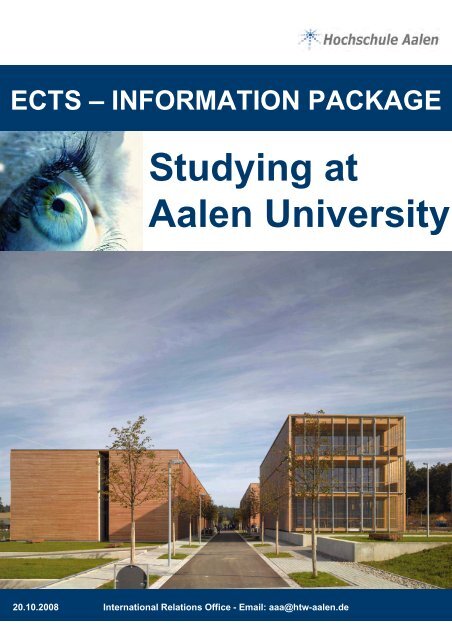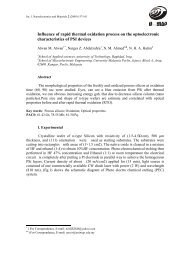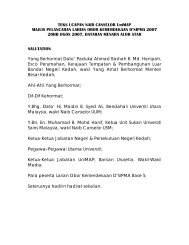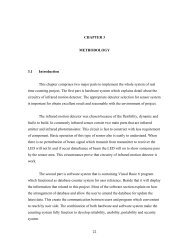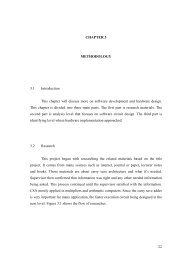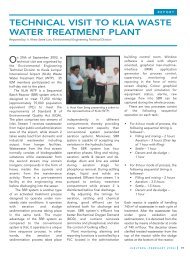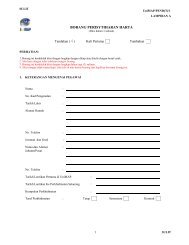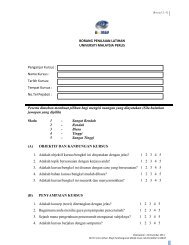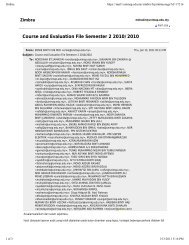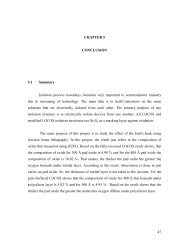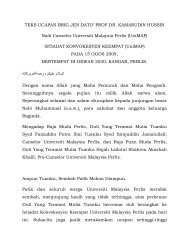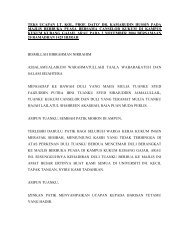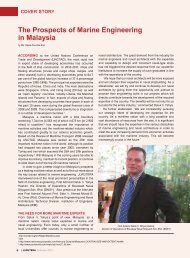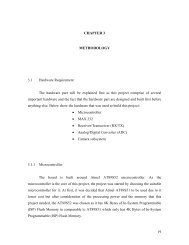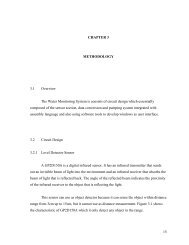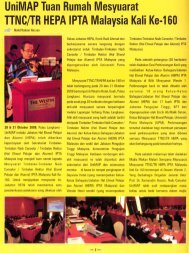12/13 Years of School Education Internship - UniMAP
12/13 Years of School Education Internship - UniMAP
12/13 Years of School Education Internship - UniMAP
Create successful ePaper yourself
Turn your PDF publications into a flip-book with our unique Google optimized e-Paper software.
ECTS – INFORMATION PACKAGE<br />
Studying at<br />
Aalen University<br />
20.10.2008 International Relations Office - Email: aaa@htw-aalen.de
ECTS Information Package<br />
I. The Concept 2<br />
II. ECTS Credits & Grading Scale 2<br />
III. ECTS Students & Credit Transfer 3<br />
IV. The Institution (HTW Aalen - University) 3<br />
V. Academic <strong>School</strong>s / Courses <strong>of</strong> Study / Syllabuses 4<br />
VI. Student Services & Associations 6<br />
VII. The City <strong>of</strong> Aalen 9<br />
VIII. Admission Requirements for Exchange Students 10<br />
IX. Admission Deadlines 11<br />
X. Best Arrival Time 11<br />
XI. Accommodation 11<br />
XII. Health Insurance <strong>13</strong><br />
XIII. Cost <strong>of</strong> Living 14<br />
XIV. Contact Address 14<br />
Pages<br />
1
I. The Concept<br />
ECTS is developed by the Commission <strong>of</strong> the European Union in order to provide common<br />
procedures, thus guaranteeing the academic recognition <strong>of</strong> studies abroad.<br />
ECTS provides a way <strong>of</strong> first measuring and comparing course contents and grades and then<br />
transferring them from one institution to another.<br />
ECTS is a system based on the principle <strong>of</strong> mutual trust and confidence between the participating<br />
institutions <strong>of</strong> higher learning.<br />
Three main rules have been established to reinforce this principle:<br />
(1) information on available courses<br />
(2) bilateral agreements between the home and host institutions<br />
(3) the use <strong>of</strong> credit points to indicate students' workloads<br />
Participating institutions implement these rules through the use <strong>of</strong> information packages<br />
(available at the IRO and your department), which provide general information on the host<br />
institution, as well as detailed descriptions <strong>of</strong> available programmes, courses and credit allocation.<br />
Learning Agreements between the student and the home and host institutions contain the<br />
student's personal information and a description <strong>of</strong> the intended study abroad programme.<br />
Finally, the Transcript <strong>of</strong> Records shows the student's academic achievements prior to and after<br />
the study abroad period.<br />
II. ECTS Credits & Grading Scale<br />
ECTS is a credit system based on student workload. The credits represent a value allocated to<br />
course units which indicate the amount necessary to complete them. They reflect the quantity <strong>of</strong><br />
work that each course requires in relation to the total amount <strong>of</strong> work required to complete a full<br />
year <strong>of</strong> academic study at that institution (work may be in the form <strong>of</strong> lectures, practical activities,<br />
seminars, self-directed studies - in the library or at home - and examinations or other forms <strong>of</strong><br />
assessment). Thus ECTS credits represent a relative value.<br />
According to ETCS, 60 credits represent the workload <strong>of</strong> a full year <strong>of</strong> study; normally a student<br />
earns 30 credits for a semester and 20 credits for a term. It is up to the participating institutions to<br />
subdivide the credits for the various courses. ECTS credits should be allocated to all available<br />
courses, whether they are required or elective.<br />
Practical placements and optional courses which form an integral part <strong>of</strong> the course <strong>of</strong> study also<br />
receive academic credit. Non-credit courses, however, may also be mentioned in the transcript <strong>of</strong><br />
records. Credits will only be awarded for completed courses in which all required examinations have<br />
been successfully taken.<br />
Examination and assessment results are expressed in a variety <strong>of</strong> different grading systems in<br />
Europe. In order to enable institutions to interpret grades awarded to ECTS students, a<br />
corresponding grading scale has been developed. An ECTS grade provides information on the<br />
student's achievements in addition to the institutional grade, but it does not replace the local<br />
grade.<br />
2
The ECTS grading scale is based on the combined use <strong>of</strong> appropriate keywords and numerical<br />
definitions intended to assist the transparency <strong>of</strong> the keywords.<br />
ECTS GRADE<br />
(local grade)<br />
A<br />
(1,0 - 1,5)<br />
B<br />
(1,6 - 2,0)<br />
C<br />
(2,1 - 3,0)<br />
D<br />
(3,1 - 3,5)<br />
E<br />
(3,6 - 4,0)<br />
FX<br />
(4,1 - 5,0)<br />
F<br />
(4,6 - 5,0)<br />
% <strong>of</strong> students<br />
who normally<br />
earn this grade<br />
10<br />
25<br />
30<br />
25<br />
10<br />
-<br />
-<br />
DEFINITION<br />
EXCELLENT:<br />
outstanding performance with only minor<br />
errors<br />
VERY GOOD:<br />
above average but with some errors<br />
GOOD:<br />
generally sound work with a number <strong>of</strong><br />
notable errors<br />
SATISFACTORY:<br />
fair but with significant shortcomings<br />
SUFFICIENT:<br />
performance meets the minimum criteria<br />
FAIL:<br />
some more work required before the<br />
credit can be awarded<br />
FAIL:<br />
considerable further work is required<br />
The number <strong>of</strong> grades <strong>of</strong> the ECTS grading scale is a compromise. Fewer grades would transfer too<br />
little information; more grades would imply a level <strong>of</strong> accuracy that does not exist.<br />
III. ECTS Students & Credit Transfers<br />
Students participating in ECTS will receive full credit for all academic work successfully completed<br />
at any <strong>of</strong> the ECTS partner institutions. They will be able to transfer these academic credits from<br />
one participating institution to another as long as a learning agreement has been signed between<br />
the student and the institutions involved which describes the content <strong>of</strong> the study programme to be<br />
followed abroad.<br />
After the student has successfully completed the agreed upon study programme and returned to<br />
the home institution, credit transfer can then place. The student is thus able to continue the course<br />
<strong>of</strong> study at the home institution without any loss <strong>of</strong> time or credit.<br />
For this purpose, the transcript <strong>of</strong> records details every course taken by the student and includes<br />
the number <strong>of</strong> ECTS credits completed as well as the grade awarded (on the local grading scale).<br />
When available an ECTS grade is also included.<br />
The transcript <strong>of</strong> records, the information package and the learning agreement are used by the<br />
institutional and departmental coordinators appointed by each institution to deal with the<br />
administrative and academic aspects <strong>of</strong> ECTS.<br />
IV. The Institution<br />
A variety <strong>of</strong> opportunities is available for you to choose from. Founded in 1963 as a state<br />
engineering school and transformed into a university <strong>of</strong> applied sciences in 1971, Aalen University<br />
currently hosts 4000 students studying in the university’s five academic schools, which are<br />
Chemistry, Electronics & Computing Science, Management & Business Studies, Mechanical<br />
Engineering and Optics & Mechatronics.<br />
3
Students are taught by about <strong>12</strong>0 pr<strong>of</strong>essors. In addition to the academic staff, there are another<br />
160 personnel plus a considerable number <strong>of</strong> student services volunteers, all providing services to<br />
allow for an ideal study environment. A further 100 part-time employees coming from private<br />
companies (managers, engineers etc.) lecture on special subjects, supplying a perfect link between<br />
theory and practice.<br />
Aalen University is member <strong>of</strong> the German Academic Exchange Service (DAAD - Deutscher<br />
Akademischer Austauschdienst) and the German Association <strong>of</strong> Universities (HRK –<br />
Hochschulrektorenkonferenz).<br />
* Academic Authorities<br />
University Management: consisting <strong>of</strong> Rector, 2 Vice-Rectors and Chancellor (“Rektorat”)<br />
Academic Board: consisting <strong>of</strong> Rectorship, Deans, elected Pr<strong>of</strong>essors, staff & students (“Senat”)<br />
Advisory Board: consisting <strong>of</strong> external and internal personalities (“Hochschulrat”)<br />
University Council: consisting <strong>of</strong> external personalities mainly from industry (“Kuratorium”)<br />
* Academic Calendar<br />
Winter Semester: 01.09. – 28.02.<br />
Summer Semester: 01.03. – 31.08.<br />
Lecturing Periods: Beginning <strong>of</strong> October – End <strong>of</strong> January<br />
Mid-March – End <strong>of</strong> June<br />
Examination Periods: 1 st 2 Weeks <strong>of</strong> February and<br />
1 st 2 Weeks <strong>of</strong> July<br />
* The Student Population<br />
10% <strong>of</strong> the overall student population at Aalen University consists <strong>of</strong> international students coming<br />
from more than 50 different countries. But, regardless <strong>of</strong> where you come from, you should expect<br />
no less than our warmest welcome. Aalen University is a modern university where academic<br />
excellence in both teaching and research is a standard not to be compromised. This fact is<br />
confirmed by the numerous technology transfer centres <strong>of</strong> the institution, the library, which is very<br />
well stocked in the engineering sciences, for instance, and the scientific facilities which are<br />
modernly equipped at the very edge <strong>of</strong> technology.<br />
* Institutional ECTS - Coordinator<br />
Mr. Pascal Cromm<br />
Director International Relations<br />
HTW Aalen - University<br />
Beethovenstr. 1<br />
D-73430 Aalen<br />
eMail: aaa@htw-aalen.de<br />
V. Academic <strong>School</strong>s / Courses <strong>of</strong> Study / Syllabuses<br />
Being fully aware <strong>of</strong> the importance <strong>of</strong> your decision about where to study, the university<br />
management invites you to navigate through the university’s website (www.htw-aalen.de or<br />
www.international.htw-aalen.de). We can ensure you that we will do our best to make your studies<br />
as productive, rewarding and enjoyable as possible.<br />
As mentioned before, the university’s five academic schools are Chemistry, Electronics &<br />
Computing Science, Management & Business Studies, Mechanical Engineering and Optics &<br />
Mechatronics.<br />
4
Within each <strong>School</strong> there are several departments (exception Chemistry where <strong>School</strong> =<br />
Department). Each department (“Studiengang”) is <strong>of</strong>fering at least one course <strong>of</strong> study (called<br />
“Studienfach” or “Studienschwerpunkt”).<br />
You will find department wise under www.htw-aalen.de then “studium” all the details related to a<br />
course <strong>of</strong> study. Click onto the heading <strong>of</strong> a department and then either on “Vorlesungen” to know<br />
which lecture is given on what day and time or on “ECTS” to get information about lecture<br />
contents. Within each department you will also find information to the syllabus <strong>of</strong> a course <strong>of</strong><br />
study (generally under “downloads”, files including “SPO” (= Studien- und Prüfungsordnung =<br />
Study and Examination Regulations) in their heading). Onto the ECTS-page you should then<br />
also generate your learning agreement.<br />
The following graph gives you an overview how our institution is structured on the undergraduate<br />
level. Further courses are <strong>of</strong>fered for graduate students, currently MSc in Vision Science &<br />
Business, MSc in Photonics and MSc in Polymer Technology (Starting the academic year<br />
2005/2006, all departments will have Master courses in their portfolio). Requests concerning<br />
admission to those courses should be addressed to aaa@htw-aalen.de.<br />
<strong>School</strong>s Departments Further Concentrations<br />
Chemistry<br />
Electronics &<br />
Computing Science<br />
Optics &<br />
Mechatronics<br />
Mechanical<br />
Engineering<br />
Management &<br />
Business Studies<br />
Polymeric & Analytical<br />
Computing Science<br />
Industrial Electronics /<br />
Technical Informatics<br />
Optometry & Acoustics<br />
Optoelectronics<br />
Mechatronics<br />
Production Engineering<br />
Mechanical Engineering<br />
Plastics Engineering<br />
Surface Technology &<br />
Materials Science<br />
Industrial Management<br />
International Business<br />
Business Studies SME<br />
Depending on the studies undertaken, the Aalen University is currently awarding (as <strong>of</strong> February<br />
2006) the following qualifications:<br />
- “Diplom-Ingenieur (FH)” (4 years degree),<br />
- “Diplom-Informatiker (FH)” (4 years degree),<br />
- “Diplom-Betriebswirt (FH)” (4 years degree),<br />
- „Bachelor“ (3,5 years degree),<br />
- „Master“ (1,5 years degree).<br />
Molecular Biotechnology<br />
S<strong>of</strong>tware / Media /<br />
Economics<br />
Media Science &<br />
Communicat. Technology<br />
Technical Editing<br />
Technical Teacher<br />
<strong>Education</strong><br />
International Technical<br />
Sales Management<br />
New students enrolling at HTW Aalen – University from the academic year 2005/2006 on can study<br />
only for Bachelor and Master Degrees.<br />
5
The following graph gives you an overview <strong>of</strong> the structure <strong>of</strong> our degrees <strong>of</strong>fered (right column,<br />
typical for universities <strong>of</strong> applied sciences focussing more on applied research) in comparison to<br />
traditional universities (left column, typical for traditional universities focussing more on<br />
fundamental research).<br />
10<br />
9<br />
8<br />
7<br />
6<br />
5<br />
4<br />
3<br />
2<br />
1<br />
• Bachelor Degrees take 7 Semesters for graduation.<br />
• In their 5 th semester, students must spend one semester in industry on a placement.<br />
• To graduate for a Bachelor degree requires the writing <strong>of</strong> a bachelor thesis / dissertation.<br />
• Master Degrees take 3 Semesters for graduation.<br />
VI. Student Services & Associations<br />
ASTA & USTA<br />
Master<br />
Bachelor<br />
Doctoral Studies<br />
Master<br />
(<strong>of</strong> Arts, <strong>of</strong> Sciences, <strong>of</strong> Engineering)<br />
Bachelor<br />
(<strong>of</strong> Arts, <strong>of</strong> Sciences, <strong>of</strong> Engineering)<br />
<strong>Internship</strong><br />
<strong>12</strong>/<strong>13</strong> <strong>Years</strong> <strong>of</strong> <strong>School</strong> <strong>Education</strong><br />
Although the names are practically the same, the student groups AStA (General Students'<br />
Committee) and UStA (Independent Students' Committee) have entirely different functions.<br />
Members <strong>of</strong> AStA represent student interests wherever necessary, from the University Board to the<br />
Senate and the councils <strong>of</strong> the individual schools. Other areas for student representation are the<br />
university's central facilities, the residence halls, etc.<br />
6
USTA, on the other hand, has nothing to do with the university administratively or financially. It is<br />
the association <strong>of</strong> students who organise activities and <strong>of</strong>fer services to enhance student life.<br />
Students in UStA have worked hard to provide the following services to you:<br />
• A skiing trip in February!<br />
• Regular physical activities (football, dancing, badminton, aerobics, swimming, etc.)<br />
in cooperation with sports clubs in Aalen.<br />
• Trips to musicals in Stuttgart and a cultural trip to Berlin.<br />
• Authorised seller <strong>of</strong> the International Student Identification Card (ISIC) for all sorts<br />
<strong>of</strong> student discounts in Germany and abroad. Just stop by with a photo, your<br />
passport/personal ID number, € 10,- and your letter <strong>of</strong> acceptance (if your are not<br />
an Aalen University student).<br />
• A collection <strong>of</strong> old exams and lecture notes which can be checked out.<br />
• The UStA Shop, where you can order books and buy all sorts <strong>of</strong> school supplies.<br />
(Open <strong>12</strong>:50 - 1:30 p.m. Tuesdays and Thursdays in Room 040).<br />
• The info-manual for new students.<br />
• An online information centre where you can place advertisements, look for rides, etc.<br />
• Help with questions about grants/loans (BAföG).<br />
If you would like more information or interested in becoming involved, just send an email to<br />
usta@htw-aalen.de or asta@htw-aalen.de or stop by the A/UStA <strong>of</strong>fice (Room <strong>13</strong>5) between 8:30<br />
and 11:00 p.m. on Mondays, Tuesdays or Thursdays.<br />
Refectory<br />
So you've had a gruelling morning <strong>of</strong> lectures and need to take a moment to unwind and enjoy<br />
your lunchtime with some classmates and friends. The refectory (Mensa), located across the street<br />
from the main building, is there for you Monday through Friday from 11:30 a.m. to 1:30 p.m. to<br />
fulfil your gastronomic needs. You may choose between the 2 meals <strong>of</strong> the day (Tagesmenü) or the<br />
vegetarian salad buffet, for which you pay by weight. Meal tickets are sold every Tuesday and<br />
Thursday at the entrance <strong>of</strong> the refectory.<br />
Snacks, sandwiches and beverages are available at the Cafeteria in the main building, which is<br />
open between 9:00 a.m. and 3:30 p.m. when lectures are in session. The Cafeteria also sells meal<br />
tickets, an important fact to keep in mind if you happen to be out <strong>of</strong> tickets on a Monday,<br />
Wednesday or Friday.<br />
Library<br />
So that you get along well with the collection <strong>of</strong> approximately 55,000 items and have no problems<br />
finding specialised literature and information, the library is pleased to introduce you to its range <strong>of</strong><br />
services.<br />
Checking out material is possible for everyone. Just bring your student or personal ID with you.<br />
You can take materials from the shelves yourself and bring them to the circulation desk to be<br />
checked out. Materials may be checked out for 28 days and can be renewed up to 5 times, each for<br />
a period <strong>of</strong> an additional 28 days, as long as no one has placed a hold on the item.<br />
Renewals may be done in person at the library or by telephone at the following numbers:<br />
07361/576-2105/2151 or 2353.<br />
If you have questions, are looking for books or other information or simply don't feel that you are<br />
managing very well on your own, just ask the staff at the circulation desk We would be more than<br />
happy to share our expertise with you.<br />
Is something missing from our collection or is everything in a certain subject check out? Please feel<br />
free to make suggestions to us about potential acquisitions. We will make an effort to fulfil your<br />
wishes.<br />
7
We can order books and journal articles for you from other libraries if they are not on the Aalen<br />
University campus. At the circulation desk, we can tell you more about which materials may be<br />
ordered and how much the service costs. Through the Internet, you can access numerous<br />
databases with references to specialised literature on a variety <strong>of</strong> subjects. Via the regional library<br />
service centre you may access a number <strong>of</strong> databases.<br />
A great deal <strong>of</strong> information can be found not only in books but also on CD-ROM. We have<br />
dictionaries, application-writing programs and more in our collection. Just stop by and take a look<br />
for yourself!<br />
Student life<br />
Looking for something to do after a long day <strong>of</strong> lectures or lab work? Aalen University students<br />
have a wide variety <strong>of</strong> activities available to them.<br />
One <strong>of</strong> the most cherished pastimes <strong>of</strong> Aalen students are the Thursday night parties in the main<br />
building or the mensa building, complete with a bar and (<strong>of</strong>ten) live music. The semester is kicked<br />
<strong>of</strong>f by a "Newie-Party" organised by the student association USTA and followed at regular intervals<br />
by parties planned by the individual schools and departments.<br />
USTA also organise a number <strong>of</strong> other programs <strong>of</strong> student interest, from sports to trips to musicals<br />
and cities rich in culture.<br />
In addition, one <strong>of</strong> the most beloved activities is the weekly movie held Tuesday nights in the Aula<br />
at a very reasonable price. However, if you're willing to shell out a little bit more money to see a<br />
current film, Aalen does have a cinema complex known as the "Kinopark."<br />
The city provides a number <strong>of</strong> recreation facilities, from a sports centre to tennis courts, riding<br />
halls, an ice skating rink and even ski lifts. Aalen also has its own theatre and a municipal hall used<br />
for various performances and presentations. For more information on "night" entertainment<br />
opportunities, please consult the section nightlife.<br />
Aalen is the home to a great many interest clubs, whether your passion is sports, music, dancing,<br />
gardening, film, or animals. Just ask for more information at the Tourist Office (Marktplatz 30 in the<br />
city centre).<br />
Also, if you happen to have a specific hobby, it wouldn't hurt to ask around campus - it's very likely<br />
that there are others at Aalen University with the same interests.<br />
Nightlife<br />
Aalen and the surrounding areas <strong>of</strong>fer a wide and varied nightlife, whether you prefer a noisy or<br />
quiet atmosphere, a classy setting, an evening <strong>of</strong> dancing, wine bars or maybe nothing more than a<br />
beer in a pub with some friends.<br />
Live music festivals with varying types <strong>of</strong> music are featured in the bars and pubs. A particular<br />
highlight is the yearly Jazz festival which brings the "crème de la crème" <strong>of</strong> world-famous Jazz<br />
musicians to Aalen.<br />
Modern and classic music concerts are regularly held in the city <strong>of</strong> Aalen or in the nearby cities (not<br />
more than 30 minutes from Aalen). Amateurs <strong>of</strong> theatre will also be more than satisfied with the<br />
Aalen Theatre.<br />
Hungry? Lots <strong>of</strong> culinary specialties will be found at the numerous restaurants in and nearby Aalen.<br />
Check out the regional monthly event guide Xaver which contains all the information and addresses<br />
you will need.<br />
8
The city<br />
VII. The City <strong>of</strong> Aalen<br />
The strategic importance <strong>of</strong> the geographical location <strong>of</strong> the City <strong>of</strong> Aalen was recognised very early<br />
around about 150 A.D. by the Romans and particularly by the Roman emperor Antoninus Pius. He<br />
established here the largest cavalry fort north <strong>of</strong> the Alps.<br />
A city with a long history, Aalen has attracted the interest <strong>of</strong> many rulers throughout the centuries.<br />
Economically, the city started its industrialisation with the inauguration <strong>of</strong> the railway line in 1861<br />
and created the earliest ironworks industry in southern Germany.<br />
At present, Aalen is a city to satisfy every taste.<br />
A variety <strong>of</strong> large, medium and small enterprises support its economy, and it is not surprising that<br />
Aalen, just as Baden-Württemberg, has a very low unemployment rate.<br />
At the same time, the countryside around Aalen remains untouched and its beauty attracts visitors<br />
from all over the world throughout the year. With just under 70,000 inhabitants, Aalen is able to<br />
<strong>of</strong>fer an array <strong>of</strong> opportunities in terms <strong>of</strong> entertainment and shopping without the hustle and<br />
bustle <strong>of</strong> a big city.<br />
To get a better feel for the city, just go the Aalen website and take a virtual tour <strong>of</strong> the city. As a<br />
city which dates back to Roman times, Aalen possesses a rich history and a variety <strong>of</strong> landmarks <strong>of</strong><br />
interest to visitors and residents alike.<br />
At the city's website you can take a virtual tour in English <strong>of</strong> the city centre's most famous sights.<br />
Read about the "Spy <strong>of</strong> Aalen," view pictures <strong>of</strong> half-timbered houses, the protestant city church,<br />
the market fountain, the old town hall and town square.<br />
After having explored downtown Aalen and peeked into its many and varied interesting shops,<br />
move outward and visit the Limes Museum with its collection <strong>of</strong> Roman artefacts, take a stroll<br />
through the peaceful "Schillerhöhe" park and learn about the history <strong>of</strong> mining in the region by<br />
touring the "Tiefer Stollen" mine in Aalen-Wasseralfingen.<br />
If all this sightseeing has made you weary, you next stop should be "Limesthermen," or thermal<br />
baths (are you intrigued by the idea <strong>of</strong> swimming in an outdoor heated pool while it's snowing?).<br />
From the baths, you also have access to trails which lead you through the area's splendid natural<br />
landscape. Don't forget to take the trail to the "Aalbäumle," a look-out tower with an excellent<br />
view.<br />
Beyond Aalen<br />
Aalen lies a comfortable distance from many <strong>of</strong> Germany's most famous sights.<br />
You can easily take day trips to Stuttgart, Munich, Rothenburg ob der Tauber, Ulm, Augsburg and<br />
Nuremberg.<br />
9
VIII. Admission Requirements for Exchange Students<br />
Please follow the herewith described procedure and consider also the application<br />
documents included at the end <strong>of</strong> this information package.<br />
1. Choose the department in which you wish to follow lectures or carry out a final project via<br />
the aforementioned websites.<br />
2. You must submit a learning agreement with your application. In case you intend to carry out<br />
your final project, the subject must be agreed upon at the time <strong>of</strong> your application.<br />
3. The learning agreement you hand in together with your application must carry your<br />
signature and the signature <strong>of</strong> the competent authorities <strong>of</strong> your home institution.<br />
4. As an overseas student (Non-EU) you need to make arrangements for your visa and will<br />
need a respective invitation from us, that will be send to you once we have received your<br />
complete application.<br />
5. The application documents consist <strong>of</strong><br />
- Erasmus Application Form<br />
- Antrag auf eingeschränkte Zulassung<br />
- Application Form for Accommodation<br />
- Application Form for an eMail-Account<br />
- Learning Agreement<br />
- Full transcript <strong>of</strong> records in English from your home institution<br />
- CV<br />
- Final project request form in case you wish to carry out your degree thesis in Aalen<br />
- Description <strong>of</strong> your course <strong>of</strong> study<br />
6. In case you request on your application form for accommodation a room in a student<br />
residence hall, you have to pay by bank transfer a reservation amount consisting <strong>of</strong> a<br />
deposit, a processing fee & the rent for the 1 st month. Your reservation will be valid only<br />
after confirmation from us, that your payment has well arrived. You will obtain the<br />
information where to transfer the money as soon as we obtain your application documents.<br />
7. Once you will be in Aalen, you will have<br />
- to pay the contribution to the student association<br />
(“Studentenwerk”; currently € 37,-),<br />
- to open a German bank account,<br />
- to go to the AOK – State Health Insurance for getting a confirmation that your<br />
international health insurance (E111 or other) is valid in Germany,<br />
- to go to the International Relations Office (IRO) to get your admission form and to<br />
give mandate for the payment <strong>of</strong> the rest <strong>of</strong> your rent for the total duration for your<br />
stay via monthly direct debit,<br />
- to go to the Registrar’s Office and to hand in<br />
i. copy <strong>of</strong> your admission form,<br />
ii. CV,<br />
iii. 2 photographs,<br />
iv. the pro<strong>of</strong> <strong>of</strong> validity <strong>of</strong> your health insurance,<br />
v. the pro<strong>of</strong> <strong>of</strong> payment <strong>of</strong> the student association contribution<br />
8. Before leaving Aalen, you will let a clearing form be signed by the concerned departments<br />
and bring it back to the IRO. You will also hand in a completed questionnaire concerning the<br />
evaluation <strong>of</strong> your stay in Aalen.<br />
10
IX. Application Deadlines<br />
For purposes <strong>of</strong> securing their accommodation in student residence halls, exchange students have<br />
to send their application up to the following deadlines: for the winter semester on June 1, for the<br />
summer semester on December 1.<br />
X. Best Arrival Time<br />
This point is very important, which is why we wish to emphasise on it.<br />
We recommend that international students arrive in Aalen right for the <strong>of</strong>ficial beginning <strong>of</strong> a<br />
semester (beginning <strong>of</strong> September for the winter semester and beginning <strong>of</strong> March for the summer<br />
semester). This will allow to get all the formalities done and to settle in a bit before the great rush<br />
<strong>of</strong> the semester starts.<br />
Furthermore, we expect international students to take the German intensive course three weeks<br />
before the lectures starts. Eventually students can then also participate in the orientation weeks.<br />
On the first day <strong>of</strong> the lecturing period the AStA / UStA (Students Representatives) organise a<br />
guided tour through Aalen University for the first year students. They also organise a welcome<br />
party for new students. All international students are most welcome to take part in those activities.<br />
The school is open all year through, which means that students who wish to do projects are<br />
welcome at any time.<br />
But when arriving in Aalen, please make sure that you arrive during <strong>of</strong>fice times (up to 5.00 p.m.).<br />
Otherwise, you will have serious difficulties in getting the keys <strong>of</strong> your student residence hall<br />
accommodation.<br />
XI. Accommodation<br />
Depending on your personal tastes, you have the choice <strong>of</strong> living either in one <strong>of</strong> the student<br />
residence halls or in <strong>of</strong>f-campus private accommodation.<br />
Each has its advantages and disadvantages based on price, size, location, ease <strong>of</strong> arrangement,<br />
opportunities to meet other students etc., so you should consider carefully which option is best for<br />
you.<br />
Should circumstances not work out for checking into your room upon your arrival (e.g. being late or<br />
arriving during weekend), Aalen also <strong>of</strong>fers temporary accommodations where you can stay until<br />
obtaining the key to your room.<br />
Aalen has multiple hotels within your price range, as well as a youth hostel for those who would<br />
rather stay the night there.<br />
Eichenh<strong>of</strong><br />
Stadionweg 1<br />
D-73430 Aalen<br />
Tel.: ++ 49 73 61/4 10 20<br />
A single bed costs between € 40 and € 45. This hotel is located near the both the youth hostel and<br />
Aalen University. It is also the closest, yet most reasonably priced hotel nearest to the University.<br />
Aalener Ratshotel<br />
Friedrichsstraße 7<br />
73430 Aalen<br />
Tel.: ++ 49 7361 95840<br />
A single bed will run between € 50 and € 62. This hotel is located near the centre <strong>of</strong> the city and in<br />
walking distance to the restaurants and other attractions in the main part <strong>of</strong> the city.<br />
11
“Schubart“ Jugendherberge<br />
Stadionweg 8<br />
D-73430 Aalen<br />
Tel.: 49 73 61/4 92 03<br />
This youth hostel is located 5 minutes from Aalen University. Cost starts at € <strong>13</strong>.30 and a<br />
reservation is strongly encouraged. You can reach it on the internet at<br />
http://www.jugendherberge.de/html/jugendherbergen/individual_jh.jsp?IDJH=99<br />
Student Halls <strong>of</strong> Residence<br />
In order to book a room in the halls <strong>of</strong> residence we need the filled in application form for<br />
accommodation (“Antrag auf Aufnahme im Studentenwohnheim”) well before your arrival in<br />
Aalen. Please read the following description <strong>of</strong> student dormitories and make your choice using the<br />
enclosed form. Remember to send this form to us in advance, so that we can reserve a room for<br />
you.<br />
Four residence halls are available for student housing but only two <strong>of</strong> them are easily accessible to<br />
exchange students (the other two are subject to long waiting lists):<br />
1. Carl-Schneider-Studentenwohnheim<br />
This Wohnheim is right next to Aalen University. The rent is € 186 per month. Rooms are small but<br />
comfortable and students share showers and bathrooms on the floor.<br />
There is also a kitchen and a living room on each floor. Some international students live in this<br />
Wohnheim. Each student receives a place in the refrigerator on their floor, and cabinet space. The<br />
single rooms in Carl Schneider come with a bed, work table, two chairs, and a sink. Bed linen is<br />
available in limited quantities from the building supervisor. Towels are not included. Aside from<br />
that, you are free to decorate your room according to your wishes. Each floor shares a common<br />
room and a kitchen, in which you will have a shelf in the refrigerator, your own cupboard and<br />
drawer for storing food.<br />
There is also available cooking and eating utensils for one to prepare and eat one’s food. In total,<br />
<strong>12</strong> students, each with a single room, share a floor in Carl Schneider Wohnheim. Carl Schneider,<br />
nicknamed “The Tower”, has limited room for international students. Those who wish to move into<br />
Carl Schneider should also select a second choice <strong>of</strong> a dormitory should they not be accepted to live<br />
in Carl Schneider.<br />
2. Anton-Huber-Straße 5, 7, 9, 11<br />
This new series <strong>of</strong> Wohnheim has just being built and is running since fall <strong>of</strong> 2004. This Wohnheim<br />
will <strong>of</strong>fer Wohngemeinschaft (WG) style housing, in which students share a floor, a kitchen,<br />
showers, and bathrooms. New students will also be able to get rooms in this building. This new<br />
Wohnheim is located near the university, close to the youth hostel. It is right next to the football<br />
stadium across from the main university building. There are multiple possibilities <strong>of</strong> rooms in these<br />
student accommodations. These range from students sharing a 6 room apartment, a 4 room<br />
apartment, or a 2 person apartment. The 2, 4, and 6 room apartments are set up in the traditional,<br />
German WG style. Rents are between € 240,- and € 290,- monthly.<br />
!!! IMPORTANT !!! IMPORTANT !!! IMPORTANT !!! IMPORTANT !!!<br />
The renting contracts for the halls <strong>of</strong> residence are always for a whole semester (1 st . <strong>of</strong><br />
March to August 31, or 1 st . <strong>of</strong> September to February 28) which means that you have to<br />
rent and pay a room for 6 month, no matter how long you stay, or to choose private<br />
accommodations.<br />
Two months before the end <strong>of</strong> the renting period (always 6 months) you will receive a form with<br />
which you can extend your lease on your room in the Wohnheim by a further semester<br />
(Verlängerungsantrag).<br />
<strong>12</strong>
Private Accommodation<br />
There is plenty <strong>of</strong> private accommodation available in Aalen. The monthly rent ranges between €<br />
150 for a room without shower and € 300 for a more luxurious room. At the "Studentensekretariat"<br />
you can consult a file with <strong>of</strong>fers upon your arrival and then choose for yourself.<br />
If you want us to book a room for you before your arrival, you should write us well before your<br />
arrival, and describe what type <strong>of</strong> room you expect (minimum and maximum rent, distance to the<br />
HTW, if you have a car or not, if you prefer cheap and simple or if you expect a certain standard, if<br />
you prefer to share with other students etc.). We would also like to draw your attention to the fact,<br />
that it is not easy to find private accommodation for only two or three months.<br />
We can help you find an apartment and with linguistic difficulties. Renting an apartment involves<br />
signing a lease, making arrangements to pay the rent, and paying a deposit. There are a variety <strong>of</strong><br />
students <strong>of</strong>fering accommodations on our website as well as advertising here at the university.<br />
There are also other aspects to consider such as whether the rent includes utilities, whether the<br />
apartment comes with furniture and other important points.<br />
XII. Health Insurance<br />
Adequate health insurance is obligatory for admission. And in general there is an obligation to have<br />
health insurance in Germany. All students are subject to the obligation to have health insurance<br />
including during a "stipulated" practical period at an enterprise. Students can insure themselves at<br />
a favourable rate during the period they are subject to an obligatory student health insurance.<br />
All students are entitled to compulsory statutory health insurance coverage until completion <strong>of</strong> their<br />
14th full semester, but only up to a maximum age <strong>of</strong> 30. If you meet these timing conditions, this<br />
has the positive consequence that the statutory health insurance funds must insure you at student<br />
rates.<br />
Apart from a minor personal contribution (excess) which you must pay, this health insurance<br />
covers medical fees for visiting a doctor, hospital expenses, and any prescribed medication. The<br />
student rates for statutory health insurance currently amount to about € 300.- per semester (six<br />
months). This sum already includes the premium for nursing care insurance (Pflegeversicherung)<br />
which has been introduced in Germany. You must pay your premiums to the health insurance fund<br />
before registering at your higher education institution.<br />
If you are older than 30 years <strong>of</strong> age on the date <strong>of</strong> arrival in Germany, you are strongly advised to<br />
insure yourself with a private health insurance company, since medical fees and hospital expenses<br />
are very high in Germany if you were intending to pay them by yourself. For example, just one day<br />
in hospital will cost an average <strong>of</strong> around € 200.-.<br />
Health Test<br />
If you require an entry visa, the local German embassy or consulate will advise you <strong>of</strong> whether or<br />
not you must take a medical test in your home country, i.e. present a health certificate. Germany's<br />
legislation on foreigners does not prescribe a medical test by a German physician. If you wish to<br />
extend your residence permit in Germany, then you will find that the individual federal regional<br />
states differ in their regulations regarding health tests. The state aliens' registration authority at<br />
your place <strong>of</strong> study will be able to provide information on this aspect.<br />
When coming from a non-EU-country, international students should be aware <strong>of</strong> the fact that the<br />
local immigration <strong>of</strong>fice may ask you to take a medical test even once being in Germany. You<br />
should count on this costing about € 50,-.<br />
When you enrol at Aalen University: With the proove <strong>of</strong> your health insurance you go to the local<br />
social insurance (AOK) where you will be given a "Versicherungsbescheinigung" (a document which<br />
<strong>13</strong>
states that you are covered and that you don't need a German insurance). This is the document<br />
you need when enrolling at Aalen university. When coming from a non-EU-country, international<br />
students should be aware <strong>of</strong> the fact that the local immigration <strong>of</strong>fice may ask you to take a<br />
medical test even once being in Germany. You should count with costs <strong>of</strong> about Euro 50,-.<br />
Quite a number <strong>of</strong> insurance companies <strong>of</strong>fer for a study abroad in Germany special rates for<br />
students. The International Relations Office may support you to find an appropriate insurance<br />
company.<br />
XIII Cost <strong>of</strong> Living<br />
Living and studying in Germany is <strong>of</strong>ten more expensive than students expect. Be sure that your<br />
finances are in order before departing to Germany and make sure that you have sufficient funds to<br />
cover your living expenses. You should count with around € 600,- monthly for accommodation,<br />
food, insurance (if coming from a country that has no agreement with Germany validating your<br />
national health insurance), and some standard leisure activities like cinema, swimming, pubs and<br />
the like. Of course, the needed monthly amount will also depend on your personal life style.<br />
XIV Contact Address<br />
HTW Aalen - University<br />
International Relations Office<br />
Beethovenstraße 1,<br />
D-73430 Aalen<br />
Germany<br />
Tel. ++49 7361 576 22<strong>13</strong><br />
Fax ++49 7361 576 2<strong>13</strong>6<br />
Email: aaa@htw-aalen.de<br />
Thank you very much for your attention. We wish you a pleasant journey to Aalen and a successful<br />
stay. Your International Relations Office.<br />
14
Aalen University<br />
http://www.htw-aalen.de/international<br />
Fon: + 49 7361 576 – 22<strong>13</strong> - Fax: + 49 7361 576 – 2<strong>13</strong>6<br />
International Relations Office - Email: aaa@htw-aalen.de


